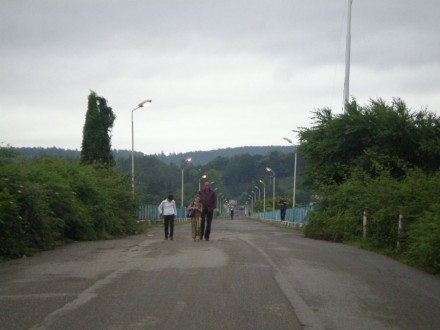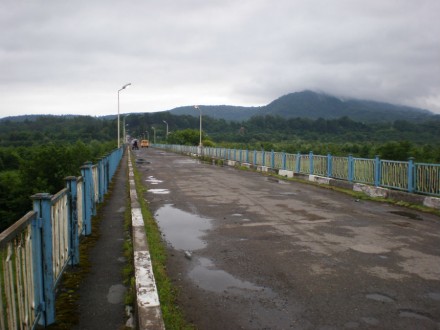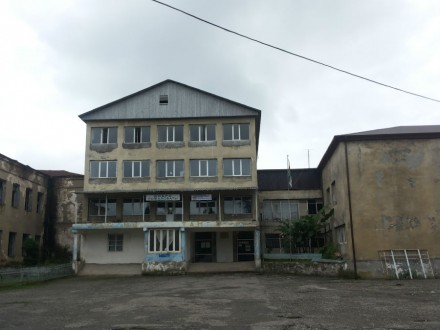
Gali, DFWatch – As the Abkhazian de facto government fails to adopt constructive integration policies, many ethnic Georgians living in the eastern districts of Abkhazia complain about prejudice as well as political, economic, and cultural discrimination.
While the breakaway region’s political status remains a bone of contention between Abkhazia, Georgia, and Russia, ethnic Georgians from the eastern part of the partially-recognised republic remain the most vulnerable community.
Mingrelians form the majority of Abkhazia’s Georgian community. They inhabit compactly Gali (Gal) district as well as parts of Ochamchire (Ochamchyra) and Tqvarcheli (Tqwarchal) districts of Abkhazia. They speak Mingrelian, an unwritten language related to Georgian. Although they form a distinct linguistic group, they tend to almost unanimously consider themselves a part of the Georgian ethnos and are regarded as Georgians under de facto Abkhazian legislation.
Mingrelians also inhabit the Samegrelo region of Georgia ‘proper’ which is a reason for the strong links between Georgians (Mingrelians) living on the territory of Abkhazia and those living in Zugdidi (capital of Samegrelo region) and other parts of Georgia ‘proper’. Historically there have been attempts by the Abkhaz at adopting identity policies aimed at distancing the Mingrelians from the Georgian ethnos, which is why arguing for any form of Mingrelian distinctiveness, including the status of their language, is an extremely sensitive political issue in Georgia, at the same time being welcome by nationalist circles in Abkhazia.
Virtually all ethnic Georgians holding Abkhazian passports had their Abkhazian citizenship cancelled on the eve of Abkhazia’s presidential elections in August 2014, which denied them the right to vote, a fact which is still sending shockwaves across the community.
Holding an Abkhazian passport had allowed Georgians to enjoy the rights held by other citizens of Abkhazia, including the right to vote, own property, set up business, attend university, and to access healthcare services. It also allowed them to legally commute across the checkpoints on the Enguri (Egry) river which divides Abkhazia from Georgian-controlled territory.

Prior to the ousting of president Alyksandr Ankwab in May 2014, up to 1,000 Georgians had had their Abkhazian passports confiscated by the authorities under pressure from nationalist opposition groups who accused them of being too ‘soft’ on Georgians and granting them passports, hence citizenship, ‘illegally’.
This was followed by the mass cancellation of citizenship following the forced change of government and the coming to power of the opposition led by Raul Hajymba. Those Georgians who have retained their passports are able to use them only as an interim document which allows them to cross the checkpoints on the Enguri, and which — according to the Abkhazian authorities — is soon to be replaced by a residency permit.
DFWatch talked to Abkhazia’s Georgians who point out that they would like to be full-fledged members of Abkhazian society by having Abkhazian citizenship. At the same time, many ethnic Abkhaz in the west of the country harbour a deep sense of distrust towards the ethnic Georgian community.
One ethnic Abkhaz from Sukhumi told DFWatch that he was worried that ethnic Georgians would rise up against the Abkhaz in the case of renewed hostilities between Abkhazia and Georgia.
The fact that the majority of ethnic Georgians hold Georgian citizenship is problematic under the Abkhazian legislation which only permits dual citizenship with the Russian Federation. Abkhazia continues to view Georgia as an enemy country due to the lack of a peace agreement and many Abkhaz cannot countenance the fact that a large minority within their territory could hold an Abkhazian passport as well as holding the passport of a country with which they consider themselves to be in a state of war.
Many Abkhaz also feel uneasy about the fact that Georgians regularly cross the checkpoints on river Enguri and foster cultural and personal ties with Georgia.
Georgians rely on crossing the Enguri in order to maintain contacts with relatives, access free healthcare, attend school, receive pensions, engage in trade, and buy products at lower prices than those available in Abkhazia.
Currently five checkpoints are operating along the Enguri, but the Abkhaz authorities are planning to limit the crossing to just one main checkpoint, known as the ‘Ingur Checkpoint’, which — if it goes ahead — will limit Georgians’ freedom of movement. However, the Abkhaz have stated that they will not close the checkpoints until the necessary infrastructure (improved roads and a bus service) is in place to allow those people living in the lower Gali zone to travel to the Ingur Checkpoint.
The Abkhazian government has discussed the possibility of granting local Georgians residence permits instead of passports. This would allow them to enjoy the same rights as before but would deny them citizenship and subsequently the right to vote in parliamentary and presidential elections. Many Georgians find the idea offensive as such a document is usually granted to foreigners, whereas their families have lived in eastern Abkhazia for centuries. They feel that such a system would perpetuate their status as ‘second-class citizens’ in Abkhazia. They also point out, though, that even such a solution would grant them more security than they currently enjoy.

Many members of the community complain about harassment or, at best, unequal treatment from Abkhazian security structures which are dominated by ethnic Abkhaz. Extortion is common as well as the selective application of the law — for instance, an ethnic Georgian is expected to be fined for not fastening their seatbelt, while an Abkhaz can, in practice, break the law without consequences.
There is also a sense of economic discrimination. The most prestigious jobs, including those in the public sector, are held by the Abkhaz. Due to the extensive personal and family networks that the Abkhaz have, it is also easier for them to mitigate the pressure from criminal groups in case they pursue business. This is a factor which affects all non-ethnic Abkhaz communities in Abkhazia, but has a particularly negative effect on the ethnic Georgians as the most vulnerable and stigmatised community within Abkhazia.
The issue of schools in Georgian-inhabited territories remains contentious. Recent decision by the Abkhazian government implies replacing Georgian teaching in Gali schools by Russian from September 1, which will be the sole language of instruction. Many Georgians regard it as a breach of their linguistic rights, while many Abkhaz point out that Georgian-language schooling will hinder integration efforts as the majority of graduates will continue their education in Georgia’s universities instead of Sukhumi due to insufficient proficiency in Russian.
A well-connected Sukhumi-based source told DFWatch that because of the failure of the Abkhazian government at integrating Georgians into the Abkhazian society, they remain vulnerable to manipulation by external factors — either Russian, Abkhaz, or Georgian.
As continued funding from Russia is dependent on closer political integration with Russia within the framework of the Russian–Abkhazian Integration Treaty (signed in late 2014), given Abkhazia’s heavy dependence on Russian funding, many fear that a severe economic crisis could befall Abkhazia should the Abkhazian government refuse to go ahead with closer integration on Russia’s terms. Such a crisis could have specific consequences for the population of the Gali district. The majority of Abkhazia’s production, especially hazelnuts, is based in Georgian-inhabited areas, and during the harvest season, the Gali population earn most of their income for the year which makes them particularly vulnerable to being the victims of robbery and extortion.
The poor relations between the local community and the Abkhazian militia, coupled with the low capacity of the militia to respond to such crimes, is another factor which puts the Georgian community at risk. In the past, the inhabitants of Gali suffered from a high level of robbery and extortion being perpetrated against the community by organised gangs. The threat has decreased in recent years but the risk of an increase in criminal activities still remains, especially as unprotected Georgian communities are an easy target during the harvest season.
Some Abkhaz also fear that Russia might try to make use of the Georgians’ dissatisfaction with their situation in Abkhazia through granting Russian passports to the population and subsequently using them as a leverage tool against the Abkhazian government. Given the history of the Abkhaz’ distrust towards the republic’s Georgian community, such a scenario would be like meddling with a powder keg.
Although there are local NGOs in both Gali and Sukhumi that raise the issues related to the situation of Abkhazia’s Georgians, as well as international organisations which highlight the issues, the Abkhazian government often fails to follow their recommendations. It seems that society as well as the authorities lack a common vision for how to respond to the question of the ethnic Georgians living on the territory of Abkhazia. Among the ethnic Georgians themselves there is no common position, with some maintaining strong ties across the Enguri, while others are focused mainly on Abkhazia.
Whatever their individual position may be, it is a clear that there is a need to come up with a solution which will protect the rights of all ethnic Georgians living in Abkhazia and allow them to feel they are equal members of society. Georgians in Abkhazia are acutely aware of their difficult situation and are keen to stress their neutrality.
‘I don’t want to fight with anyone and I don’t want to kill anyone’, a Georgian from Tqvarcheli told DFWatch. ‘I didn’t fight and I won’t fight even in a hundred years.’
The article discusses developments as seen from Abkhazia and doesn’t reflect the view of DFWatch. The word ‘Abkhaz’ refers to an ethnicity, while ‘Abkhazian’ refers to an inhabitant of Abkhazia regardless their ethnic background or an institution based in Abkhazia. Abkhaz names are transliterated according to how they would be spelled in the Abkhaz language.
Reported by Dominik K. Cagara from Gali

